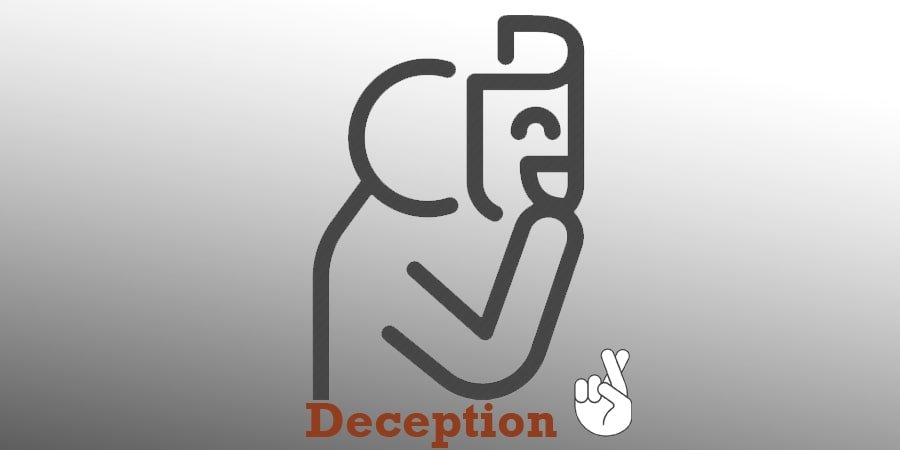Deception

Deception is the art of making others believe what you want them to.
Deception is a complex and often hidden part of our lives. It sneaks into our everyday interactions, sometimes as harmless white lies, other times as elaborate fabrications. Deception invites us to hunt into the intricacies of human nature, revealing our deepest desires, fears, and the lengths we go to protect ourselves or others. But why do we deceive? What drives us to create alternate realities, even if only for a fleeting moment?
In a world overwhelmed with information, deception becomes a double-edged sword. It can entertain, provoke thought, and inspire creativity. Yet, it also carries the potential to mislead and cause harm. As we explore the deception, we will uncover its many forms and the psychological mechanisms behind it. This journey will help us understand why deception captivates us and how it shapes our relationships, society, and even our own identities.
Types of Deception
Direct Deception
Direct deception occurs when someone deliberately provides inaccurate information. This can be through misleading instructions, staged scenarios, or exaggerated feedback. It’s a straightforward form of lying where the deceiver actively manipulates the truth.
Indirect Deception
Indirect deception involves withholding full disclosure or failing to reveal the true purpose of an interaction. This form of deception relies on omission rather than outright lies. It is about creating a misleading impression without telling a direct lie.
Self-Deception
Self-deception is the act of convincing ourselves to accept something false as true. It’s a way of justifying our beliefs or actions to ourselves, making us believe in a reality that isn’t accurate. Self-deception often helps us maintain a positive self-image or cope with stress. However, it can also lead us to make poor decisions based on these false beliefs. Our exaggerated self-views can be comforting, but they can also hurt us when reality sets in.
Characteristics of Deceivers
Manipulative
Deceivers are often highly manipulative. They can adapt to different situations and personalities to persuade others to fulfill their selfish desires. In relationships, for instance, a partner who constantly pressures the other to change might be manipulating them through deception.
Good Actors
Deceivers are skilled actors. They can convincingly portray false emotions or situations to gain trust. A good deceiver can feign illness to solicit money or sympathy, relying on their ability to convincingly play a role.
Intelligent
Deception requires a high level of intelligence. Deceivers must observe, plan, and execute their lies without arousing suspicion. Their ability to anticipate outcomes and adapt their strategies is key to their success.
Confident
Confidence is crucial for deception. A confident deceiver can speak fluently and persuasively, making their lies more believable. Their confidence helps them suppress any doubts or guilt that might otherwise betray their deception.
Eloquent
Eloquence is another common trait among deceivers. They are often smooth talkers, capable of delivering convincing arguments even when lying. Their wordplay can make even the most dubious claims seem plausible.
Keen Observers
Deceivers are keen observers of human behavior. They can read body language and verbal cues, allowing them to adjust their lies as needed. This ability helps them gauge whether their deception is succeeding or if they need to change tactics.
Sharp Memory
A good deceiver has a sharp memory. They need to remember the details of their lies to maintain consistency and avoid being caught. This mental agility allows them to keep their stories straight and reduce the chances of being exposed.
Half-Truths
Deceivers often rely on half-truths. By mixing truth with lies, they make their deception more convincing and easier to maintain. This tactic reduces the cognitive load on the deceiver, as they only need to fabricate part of the story.
Expressive
Expressiveness is another tool in the deceiver’s arsenal. They can explain their lies in such detail that others have little room for doubt. Their confidence and clarity often leave a lasting impression, making their deception more effective.
Rapid Thinkers
Deceivers are quick thinkers. They can come up with lies on the spot, especially when time is of the essence. Their ability to think on their feet allows them to maintain control of the situation and continue deceiving without hesitation.
Reasons for Deception
There are so many reasons why people lie that it’s impossible to list them all. One of the most common motives for lying is to escape punishment.
This is true for both adults and children. Other common motivations include avoiding harm to ourselves and others, protecting others’ privacy, and not wanting to embarrass ourselves in front of others. The following are a few of the most important causes.
- In order to preserve their image of themselves
- To fit in with the crowd
- Personality disorders as well as pathological, obsessive lying
- To safeguard a relationship, or to protect someone else’s feelings
- To protect another person
- To impress others and increase one’s image
- To avoid or mitigate conflict
- To avoid being awkward
Conclusion
Deception, in its many forms, is a reflection of the complexities of human nature. It can be a tool for survival, a means of protecting ourselves or others, or a way to manipulate and control. While it can serve as a coping mechanism or a creative outlet, it also has the potential to cause harm and erode trust. Understanding the motivations and characteristics of deception can help us navigate our relationships and interactions with greater awareness and integrity. In the end, the truth is often more powerful and liberating than any lie we might tell.